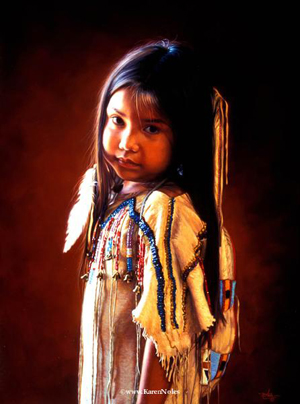|
History
Since
1999, Native American and Alaskan
communities have been participating in NACA
sponsored regional and national trainings to
improve their response to the needs to children
who have been victims of child sexual abuse.
NACA’s work helps to inspire and support the
development, growth, and maintenance of
Children’s Advocacy Centers (CACs) and
Multi-Disciplinary Teams (MDT) in Indian Country.
NACA was formed in April of 1999 and held its first
formal meeting on September 26, 1999 in Tulsa,
Oklahoma. It received its non-exempt tax status is
June, 2001 and shortly there after became a
chapter of the National Children’s Alliance. It has a
|
close partnership
with National Indian Child Welfare
Association. The Native American Children’s Alliance
was formed in
response to the need for tribal Child
Advocacy Center
development. Child
Advocacy Centers (CACs) bring together a multi-disciplinary team (MDT) that includes prosecutors, law enforcement and child protection
|
investigators, mental health and medical
professionals, victim advocates and more to
coordinate response and service to victims of
child
abuse. Many professionals did not believe it was
possible to develop CAC’s in Indian Country
given the challenges involved in multi-jurisdictional
coordination, lack of sustainability of current child
abuse program initiatives, facility–based
programming, and lack of community resources to
sponsor the “mainstream” funding model for CAC’s.
NACA was formed to support existing tribal CAC
programs and to promote the development of CAC’s
and MDT’s in tribal communities.
|
|
Mission
NACA is committed to protecting Native children and eliminating children’s physical, sexual, psychological and spiritual abuse by providing awareness, training, building partnerships in a respectful way which honors tribal sovereignty, empowers communities, and develops tribal readiness for Seven Generations.
|
NACA was
established to enhance the
safety and well-being of all Native/Alaskan Native
children and is well known
for
providing annual trainings
to develop CACs for Indian
Country.
NACA can assess a
community’s abilities to
provide services regarding:
|
|
|
"This mission means
that
we must listen to
the
voices of our
children, their
families, and their
communities in order
to create programs
and services which
will serve the needs
of child abuse
victims."
Linda
Logan,
NACA Executive
Director |
|
-
Development of
multidisciplinary teams
-
Development of interagency
agreements and protocols
-
Increasing community
understanding of
child abuse
-
Increasing prevention and
intervention services
-
Identifying valuable
resources for maintaining
programs
-
Preparation for
accreditation by the National
Children’s Alliance
NACA has been expanding outreach
to urban Indian populations and has
developed Native-specific
guides/materials to support
development of CACs.

|